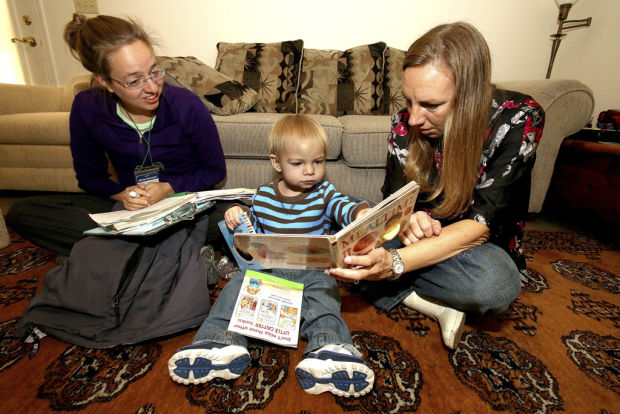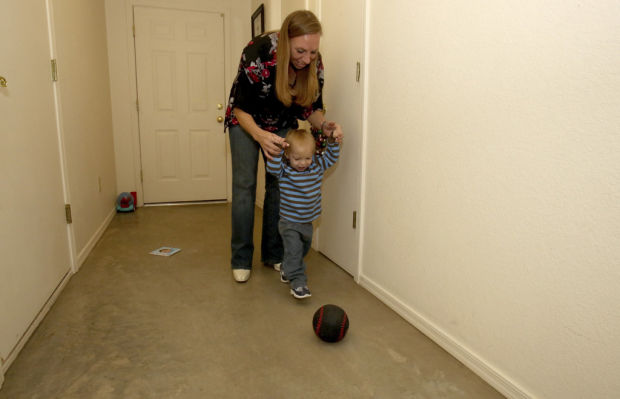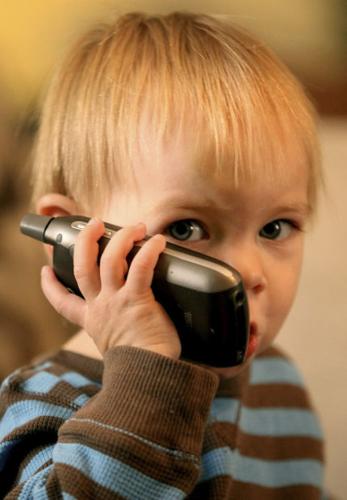Alyson Trinidad can easily name her most horrific experience ever: the day seven and a half years ago when Child Protective Services took away her daughter Jennie, then 18 months old.
Trinidad, now 36, says her addiction to meth caused her to neglect her daughter.
“She was always fed, she was always bathed, she was always clothed,” Trinidad says. “But I think my interaction with her was very limited because of the highs and lows of the drug and frustration and mood swings and everything. It was very hard.”
Many times, Jennie was left alone in her high chair, propped in front of the TV, while her mother escaped to another room to get high. If Trinidad spent the whole night awake and couldn’t drag herself out of bed the next day, Jennie would roam the house, playing alone.
When her second child, Gabriel, was born 18 months ago, Trinidad sought help to become a better parent through the Healthy Families Arizona program.
“I just wanted to do more for my son that I wasn’t able to do for Jennie,” she says.
Healthy Families, which has been offered for 22 years in the state, provides education and support to new parents.
It aims to prevent child abuse and neglect by focusing on improving parenting skills and building relationships between parents and children.
“If we can increase a parent’s capacity to manage stress and to build empathy and an emotional connection with their child, they are less likely to abuse and neglect their child,” says Zoe Lemme, program director of Pima County Healthy Families.
About 720 families have enrolled in the voluntary program in Pima County so far this year.
The program starts working with parents before their children are 3 months old, and in some cases, during pregnancy. Most participants are referred to Healthy Families by social workers who conduct hospital screenings of newborns.
“They’re going to look for a family who’s highly stressed — maybe it’s financial, perhaps they have substance abuse, a single parent, a teen parent, any of those things where parenting is now one more thing on top of their already stressed lives,” Lemme says.
The program is highly effective, a 2010 Department of Economic Security report on child and family services shows. Nearly 99 percent of Healthy Families participants in Arizona had no Child Protective Services reports.
DES cut funding for the program from $18 million in 2008 to $6 million in 2009. Emergency dollars from First Things First helped keep the program going in many communities, but the number of sites statewide was nearly halved that year, and 20 percent fewer families were reached, the DES report says.
The program has grown since 2009, but its reach is not as vast as it was before the budget cuts, Lemme says.
Through Healthy Families, support specialists conduct in-home visits and follow a curriculum that supports a child’s social and emotional development and enhances parenting skills.
Family support specialists also help parents identify and set goals for themselves and their children.
During the first six months after birth, families get a weekly visit. The length between visits increases the longer a family is in the program, Lemme says, “really moving them to increased self-sufficiency, increased confidence and feeling empowered as parents.”
Families can remain in the program for up to five years, but many leave between the first and second year.
“That’s really the nice part of being a voluntary program, that once families feel their needs have been met, they can move on to something different,” she says.
During a typical session, which lasts about an hour, the family-support specialist checks in on any stressors the family may be experiencing, discusses goal progress and introduces age-appropriate activities to support the child’s development.
“So many families, when they’re highly stressed, play is the first thing that goes, and so the ability to play and have joy is really important,” Lemme says. “Everything that child is learning, hopefully they’re learning through play. The ability to bring joy and happiness is important as well, because people are more likely going to ask you to come back if the visit was fun.”
For Trinidad, learning how to interact with her son has been the most helpful part of the program.
With Jennie, she rarely played on the floor or read to her.
“I was using until she was about a year and half old, and those are prime times of development with a child,” Trinidad says.
She was reunited with her daughter after eight months. She was sober, but struggled with being socially involved with Jennie and disciplining her.
“I dealt with a lot of guilt from what I did, so I let her get away with stuff,” she says.
Healthy Families teaches Trinidad activities that help stimulate Gabriel and have strengthened her bond with him.
The lessons she’s learned through the program have helped her relationship with Jennie as well — now she understands the importance of being an attentive, hands-on parent.
“It really has me more involved in the family as a whole,” she says, “and understanding what a child really needs, that interaction and bonding.”






